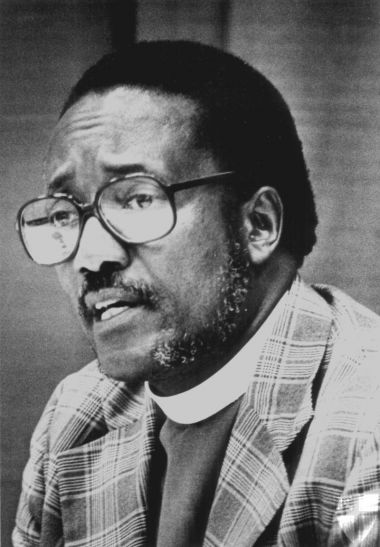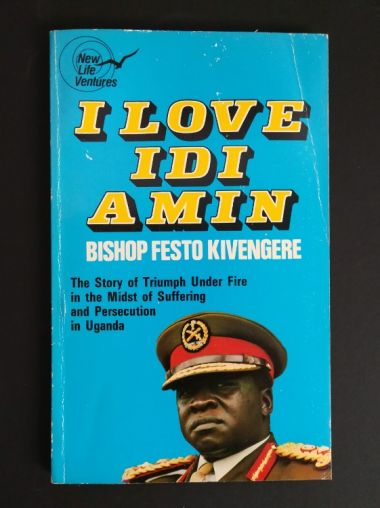I Love Idi Amin

In the time and reign of Idi Amin in Uganda (1971 – 1979), the challenges to Bishop Festo Kivengere (African Enterprise East African Team Leader and Co-Leader with Michael Cassidy) and the Anglican Church's other bishops were immense and frightening.
Amin became one of the most brutal dictators of the 20th century and an estimated 400,000 people were slaughtered during his reign.
He started out looking like a benevolent dictator and Festo and the other bishops sort of tolerated him, but gradually he became more and more brutal and he made life cheaper and cheaper.
Those who opposed him were ruthlessly assassinated and multitudes "were disappeared", as locals put it. So the major requirement in Festo, other bishops and the Church as a whole was courage in facing the dictator's threat.
All of this raised very acutely the assorted issues relating to Church and State, and how long and how far the Church could continue per Romans 13:1, to "submit to the powers that be".
Clearly Festo could not sanction revolution or attempt to see the dictator overthrown violently, but clearly he and the other bishops had to figure out at what point the Church could no longer sanction submission to state brutality.
Festo and his colleagues knew that Jesus had said "render to Caesar the things that are Caesars and to God the things that are God's" (Mark 12:17). The challenge for Festo and others was to discern at what point Caesar was asking people to render to himself the things that were God's.
In early 1980, Archbishop Janani Luwum (who was also AE's Ugandan chairman), Festo and the other Anglican bishops drew up a very bold document challenging Amin about his behaviour and where he was taking the country.
This infuriated Amin and he ordered the assassination of Luwum in cold blood. It was clear that Festo had now become no 1 on Amin's hit list and all the local Christian brethren urged Festo and his wife Mera to flee at once.
This they did through forest tracks leading to the base of the mountains separating Uganda from Rwanda. Festo and Mera courageously trekked up the mountainsides during the night until finally they crossed the border into Rwanda where they received a huge welcome.
Cries for help
Festo and Mera then went through to our office in Nairobi which they found flooded with Ugandan exiles and cries for help. The new challenge now was to Festo's heart and conscience as to what his response would be to these exiles. Because Festo was so well known and so well loved these exiles turned to him and to AE rather than to major aid agencies.
There and then effectively, Festo and AE Kenya/Uganda launched RETURN (Relief, Education and Training for Ugandan Refugees Now). In the end this programme ran for several years and AE funded over 300 international university scholarships for the refugees who qualified. Some later ended up in new governments in Uganda and felt they owed much to AE.

Festo and Mera then travelled on via London to AE's office in California. But in London, Festo faced an awesome spiritual challenge in terms of his attitude as a Christian to Idi Amin who had terrorised his country, sought to kill him personally, and driven him and his wife into exile.
In a Good Friday service at John Stott's London church, All Souls Church, Langham Place, Festo and Mera attended a Good Friday service. Festo's heart was filled with bitterness, almost hatred, towards Idi Amin but in the sermon Festo heard Jesus's words from the cross: "Father forgive them, for they know not what they do."
The voice of the Lord
Festo then heard the voice of the Lord saying to him: "My son, if Amin had been in that circle of soldiers crucifying me, would I have said 'Father, forgive them all, except this big Ugandan below me." Festo's response became determinative for the rest of his life as he responded to Jesus saying, "Lord, I am here and now forgiving Idi Amin." Immediately he felt a huge release in his soul and he was flooded with the joy and peace of the Lord.
For the rest of Festo's days, the message of forgiveness and reconciliation became even more central to his whole life and being and ministry. His new posture even led him into writing a small book called I Love Idi Amin.
A reporter in a press conference asked him how on earth he could write a book with this title. Replied Festo: "I may not like Idi Amin but if I am a Christian believer I am obliged to forgive him, love him with Christ's love, and want the highest and best for his life."
Another reporter asked: "If you were standing face to face with Amin, and someone gave you a revolver, what would you do?"
"Well," replied Festo, "I would hand the revolver back and say this is not my weapon. My weapon is love."
The next big challenge Festo faced in conjunction with our USA board was to be practical and raise vast sums of money for the ever-developing needs in Uganda. Warwick Olson proceeded to launch an AE office first in Australia and then in the UK through which these Ugandan monies could be channelled to the needs back in that country.
Mission travel
Through these years of Festo's exile from Uganda, Michael travelled with him in many places ranging from the USA and Canada through to Australia, several countries of Latin America, Egypt, Liberia in West Africa, and South Africa.
Festo's message of love and forgiveness melted hearts everywhere and Michael felt ever after the immensity of the privilege he had had of ministering around the world with this great brother.
Festo died from leukaemia in 1988 and he and Michael had a very poignant time together in their last meeting in a Nairobi hospital. Michael and most of the other team leaders and board chairs travelled in a chartered plane with Festo's coffin back to Uganda for the funeral in Namirembe Cathedral where Michael was one of the main speakers.











